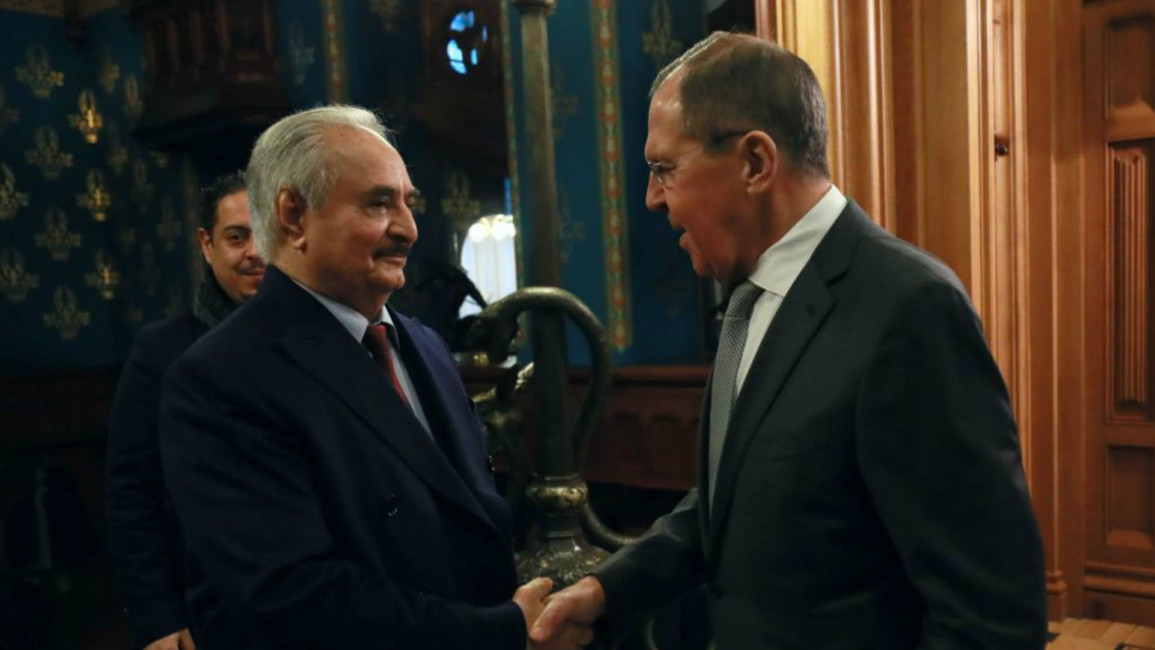
Haftar hightails it from Russia, leaving hopes for peace in his wake
At this week's talks in Moscow, both Russian and Turkish ministers showed optimism over progress, hoping to put an end to nine months of destabilizing violence since Haftar's current offensive began last April. The deal on the table entailed a withdrawal from both sides, though analysts argued that it ultimately favoured Haftar, particularly after the ground his forces have gained.
Despite this, Haftar audaciously walked out of the peace talks on Monday evening without signing Moscow's proposed deal. Forgoing the option of waiting until Tuesday morning to decide on the terms, Haftar left Russia, and the very next day, his domestic allies declared the war back on.
Russia's hosting of Haftar initially showed it could become a dominant powerbroker in Libya. Yet even though Russia has been one of the so-called Libyan National Army's (LNA) various international backers, Moscow's influence over Haftar - which emerged following Russia's cooperation with Turkey in establishing a ceasefire - has clearly been overestimated.
So what exactly went wrong, at a time when optimism and hopes for a breakthrough existed?
Haftar returned to Libya from exile in the 2011 revolution with delusions of grandeur, convincing Libyans he could be their saviour; able to succeed Muammar Gaddafi's rule over the country. While initially ridiculed, he later amassed a force, backed by several external powers, and revealed his aims of dominating Libya through warfare and controlling it by force; democracy and negotiations were unacceptable.
A sheer sense of megalomania has given Haftar the courage to defy peace talks and international law, while continuing a destructive military campaign with the belief it will benefit Libya.
 |
A sheer sense of megalomania has given Haftar the courage to defy peace talks and international law |  |
Pursuing a charm offensive and showing diplomatic prowess, he has managed to court various international actors, promising that empowering him is the answer to their geopolitical and security concerns in the country and wider region.
Putin likely feels humiliated at Haftar's withdrawal from peace talks, which could damage Russia's image as a regional peacebroker. A bold move, considering that Russia has provided Haftar with considerable military support, and that the threat of ending it is ever-present.
Yet given the extraordinary depth of Haftar's international backing from France, Egypt, the United Arab Emirates and Saudi Arabia, he is imbued with overwhelming confidence to renew his campaign and therefore hold out for a better deal for his interests.
Twitter Post
|
A similar scenario to that in Moscow occurred during an Egypt-sponsored meeting in Cairo in February 2017, when Haftar refused to compromise with GNA President Fayez al-Serraj and rejected peace efforts, despite Egypt's significant backing towards his forces. Haftar was willing to walk away as he was obviously not reliant on Cairo's support compared to other countries.
Haftar clearly conveys a "you need me, more than I need you" narrative, which is partly true given the alternative external support he receives, while Moscow and other backers consider him crucial in securing their own avaricious interests in Libya.
The LNA still receives vast Emirati, French and Egyptian support. The UAE has already indicated it is not interested in peaceful unification in Libya, as the Moscow talks were intended to facilitate. Meanwhile Cairo is more focused on securing its western border, or Libya's east - which Haftar's forces firmly control, rather than reaching a genuine peace settlement for Libya.
Haftar entered the peace talks with several Emirati advisors. Abu Dhabi cooperated with Russia to encourage Haftar to attend the talks. Some have speculated that the UAE's advisors even encouraged Haftar to reject them, which could be possible, considering Abu Dhabi's firm hold on the warlord, and given their support outweighs that of any other state. Furthermore, both would oppose any threats to their leverage.
As GNA president Serraj was willing to engage in peace talks, despite the peace deal reportedly leaving his forces with decreased influence, it shows the GNA was more willing to end the fighting.
Haftar will likely continue his offensive until he can substantially cripple the GNA's forces, perhaps to the point of disarmament, so he will be in a prime position to gain further power; or even overwhelm Tripoli and seize the country by force.
Such a process could further disintegrate Libya, proliferate the humanitarian suffering and leave peace an even more distant prospect.
 |
Haftar clearly conveys a 'you need me, more than I need you' narrative |  |
It could also lead to a chain reaction of violence. Turkish President Recep Tayyip Erdogan has vowed he won't hold back from "teaching [Haftar] a lesson" should he continue fighting, after having "run away" from the Moscow talks. Meanwhile Haftar threatened to "declare jihad and a call to arms" against Ankara deploying troops to shore up its GNA ally.
Though Haftar was initially willing to engage in peace talks in Moscow following pressure from his backers, greater international constraints could force Haftar's hand in negotiations. And though widely considered to be a stubborn character, especially by those who have met him, his confidence is arguably only as much as his international backers allow it.
Yet without substantial collective action, especially among those backing Haftar, future peace initiatives will be impotent, which will further sow the seeds of long-lasting instability.
Jonathan Fenton-Harvey is a freelance journalist.
Follow him on Twitter: @jfentonharvey
Opinions expressed in this article remain those of the author and do not necessarily represent those of The New Arab, al-Araby al-Jadeed, its editorial board or staff.




